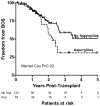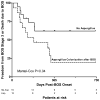Aspergillus colonization of the lung allograft is a risk factor for bronchiolitis obliterans syndrome
- PMID: 19459819
- PMCID: PMC4214373
- DOI: 10.1111/j.1600-6143.2009.02635.x
Aspergillus colonization of the lung allograft is a risk factor for bronchiolitis obliterans syndrome
Abstract
Multiple infections have been linked with the development of bronchiolitis obliterans syndrome (BOS) post-lung transplantation. Lung allograft airway colonization by Aspergillus species is common among lung transplant recipients. We hypothesized that Aspergillus colonization may promote the development of BOS and may decrease survival post-lung transplantation. We reviewed all lung transplant recipients transplanted in our center between January 2000 and June 2006. Bronchoscopy was performed according to a surveillance protocol and when clinically indicated. Aspergillus colonization was defined as a positive culture from bronchoalveolar lavage or two sputum cultures positive for the same Aspergillus species, in the absence of invasive pulmonary Aspergillosis. We found that Aspergillus colonization was strongly associated with BOS and BOS related mortality in Cox regression analyses. Aspergillus colonization typically preceded the development of BOS by a median of 261 days (95% CI 87-520). Furthermore, in a multivariate Cox regression model, Aspergillus colonization was a distinct risk factor for BOS, independent of acute rejection. These data suggest a potential causative role for Aspergillus colonization in the development of BOS post-lung transplantation and raise the possibility that strategies aimed to prevent Aspergillus colonization may help delay or reduce the incidence of BOS.
Figures



Comment in
-
An unwelcome guest: Aspergillus colonization in lung transplantation and its association with bronchiolitis obliterans syndrome.Am J Transplant. 2009 Aug;9(8):1705-6. doi: 10.1111/j.1600-6143.2009.02709.x. Epub 2009 Jun 16. Am J Transplant. 2009. PMID: 19538485 Free PMC article. No abstract available.
References
-
- Burton CM, Carlsen J, Mortensen J, Andersen CB, Milman N, Iversen M. Long-term survival after lung transplantation depends on development and severity of bronchiolitis obliterans syndrome. J Heart Lung Transplant. 2007;26(7):681–686. - PubMed
-
- Trulock EP, Christie JD, Edwards LB, Boucek MM, Aurora P, Taylor DO, et al. Registry of the International Society for Heart and Lung Transplantation: twenty-fourth official adult lung and heart-lung transplantation report-2007. J Heart Lung Transplant. 2007;26(8):782–795. - PubMed
-
- Heng D, Sharples LD, McNeil K, Stewart S, Wreghitt T, Wallwork J. Bronchiolitis obliterans syndrome: incidence, natural history, prognosis, and risk factors. J Heart Lung Transplant. 1998;17(12):1255–1263. - PubMed
-
- Keenan RJ, Lega ME, Dummer JS, Paradis IL, Dauber JH, Rabinowich H, et al. Cytomegalovirus serologic status and postoperative infection correlated with risk of developing chronic rejection after pulmonary transplantation. Transplantation. 1991;51(2):433–438. - PubMed
-
- Keller CA, Cagle PT, Brown RW, Noon G, Frost AE. Bronchiolitis obliterans in recipients of single, double, and heart-lung transplantation. Chest. 1995;107(4):973–980. - PubMed
Publication types
MeSH terms
Substances
Grants and funding
LinkOut - more resources
Full Text Sources
Medical

